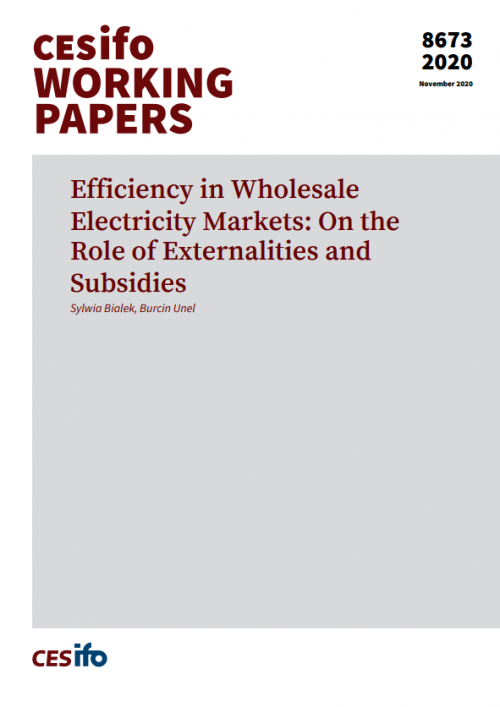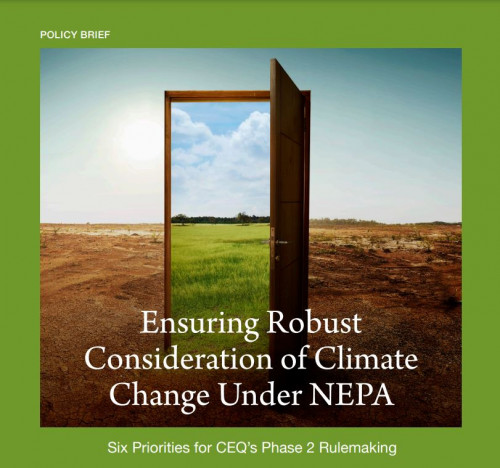-
Joint SC-GHG Comments on Proposed DOE Standards for Room Air Conditioners and Pool Heaters
Together with partner groups, we submitted joint comments to the Department of Energy (DOE) on its proposed rule to strengthen energy conservation standards for room air conditioners and pool heaters. Our comments applaud the agency for appropriately applying the social cost of greenhouse gases to estimate the climate benefits of the proposed standards, even though the standards would be cost-benefit justified without considering any climate benefits. We also encourage DOE to expand upon its rationale for adopting a global damages valuation and for the range of discount rates it applies to climate effects.
-
Comments to EPA on Proposed Heavy-Duty Vehicle Emission Standards
In March 2022, EPA proposed standards to regulate emissions of nitrogen oxides and particulate matter from heavy-duty vehicles beginning with Model Year 2027. Policy Integrity submitted comments recommending that EPA strengthen these crucial standards in order to fulfill EPA's statutory duty to set standards "reflecting the greatest degree of emission reduction achievable." We also made a number of recommendations designed to ensure that EPA is properly comparing regulatory alternatives and accounting for the benefits of strong regulation.
-
Amicus Brief in Fifth Circuit Supporting Reversal of Injunction on the Social Cost of Greenhouse Gases
In this amicus brief, we explain how the Interagency Working Group based its climate-damage valuations on voluminous and expert science, and that its approach followed regulatory guidance and precedent. In particular, the brief supports the Working Group's selection of discount rates and geographic scope, explaining how those choices followed expert consensus and were consistent with agency treatment of other regulatory impacts.
-
Efficiency in Wholesale Electricity Markets: On the Role of Externalities and Subsidies
Published in Energy Economics
In our article published in Energy Economics, we use economic modeling to analytically show the relationship between generation subsidies and energy and capacity markets. We show that the feared capacity price suppression can happen only under limited circumstances and that in the short-run, the subsidies will tend to increase capacity prices. We also demonstrate that while subsidies cannot produce the first-best outcomes, there exists a range of welfare-enhancing subsidy rates and designs that improve welfare, such that regulators should think of subsidies as one of the tools available for increasing electricity market efficiency.
-
Comment Letters on FERC’s Proposed Policy Statements for Natural Gas Infrastructure
In February, the Federal Energy Regulatory Commission released two policy statements that acknowledged the Commission’s role in shaping the nation’s transition to a low-carbon future and called for the consideration of climate impacts in pipeline certificate proceedings. Today, the Institute for Policy Integrity filed two comment letters to these proposed policy statements.
In one of our comment letters—filed jointly with over two dozen legal scholars from institutes across the country—we rebut arguments from opponents of the policies that the Commission lacks authority to consider climate effects in its oversight of natural gas infrastructure under the Natural Gas Act.
In our other comment letter, we explain that the policy statements serve as an important step toward ensuring that upstream and downstream emissions are properly considered in line with the Commission’s statutory obligations, but provide several suggestions for improvements.
-
Comments to FERC on Regional Energy Access Expansion Project DEIS
Today we submitted comments to FERC on the draft environmental impact statement for Transcontinental Gas Pipe Line Co.'s Regional Energy Access Expansion Project. These comments offer recommendations for improving the Commission's assessment of climate and environmental justice impacts of the project, and its consideration of alternatives.
-
Ensuring Robust Consideration of Climate Change Under NEPA
Six Priorities for CEQ’s Phase 2 Rulemaking
In April 2022, the Council on Environmental Quality (CEQ) finalized a limited, “Phase 1” rulemaking to restore several longstanding features of the regulations that guide agency assessments under the National Environmental Policy Act (NEPA) which CEQ had removed in 2020. In that rule, CEQ reaffirmed its intentions to further revise the regulations to better ensure that agencies make decisions that “advance environmental, climate change mitigation and resilience, and environmental justice objectives.” This policy brief outlines six simple regulatory revisions that CEQ should prioritize for its “Phase 2” rulemaking to improve consideration of climate change during environmental review.
-
Comments to CEQ on Carbon Capture, Utilization, and Sequestration Guidance
The White House Council on Environmental Quality (CEQ) recently released interim guidance on Carbon Capture, Utilization, and Sequestration (CCUS) to assist federal agencies with regulation, permitting, and associated activities. We filed comments urging CEQ to update the guidance document with additional targeted recommendations for agencies on monitoring, reporting and verification (MRV) programs; project prioritization; and other topics.
-
Comments on New York PSC’s Grid Planning Process
New York's electric utilities have developed a coordinated grid planning process and an updated approach to analyzing the benefits and costs of infrastructure investments. Policy Integrity filed comments urging the Commission to recognize that compliance with the Climate Act in relation to grid planning requires, at the very least, consideration for planning decisions' impacts of global and local pollutants.
-
Amicus Brief on New Jersey’s Zero-Emissions Credits Program
In 2018, New Jersey established a Zero-Emissions Credits (ZECs) program, which provides subsidies to the state’s nuclear power plants for reducing carbon emissions in the energy sector. Our amicus brief explains how the Social Cost of Carbon is the best available estimate for valuing harms caused by carbon dioxide emissions. We also argue that the ZECs program should account for the benefits of avoided emissions both inside and outside of New Jersey.
Viewing recent projects in Climate and Energy Policy








